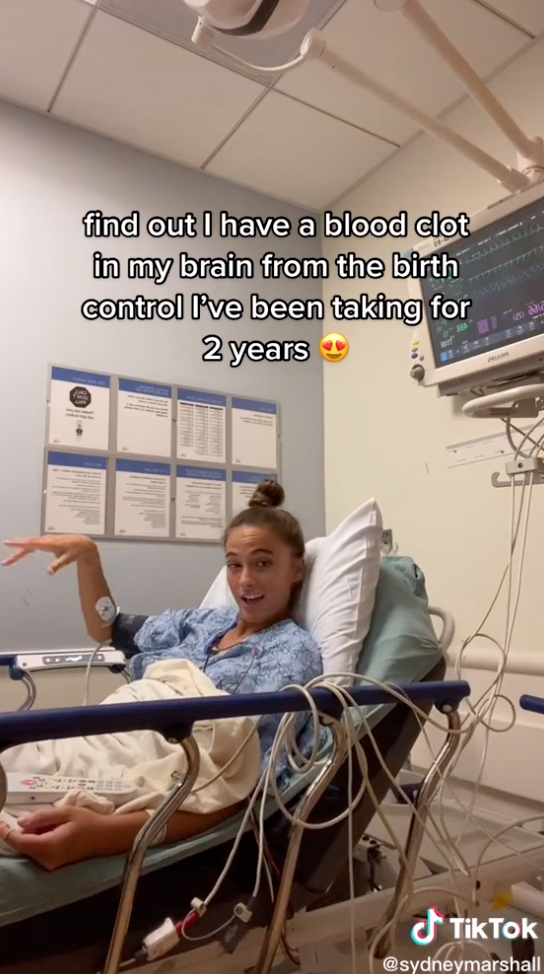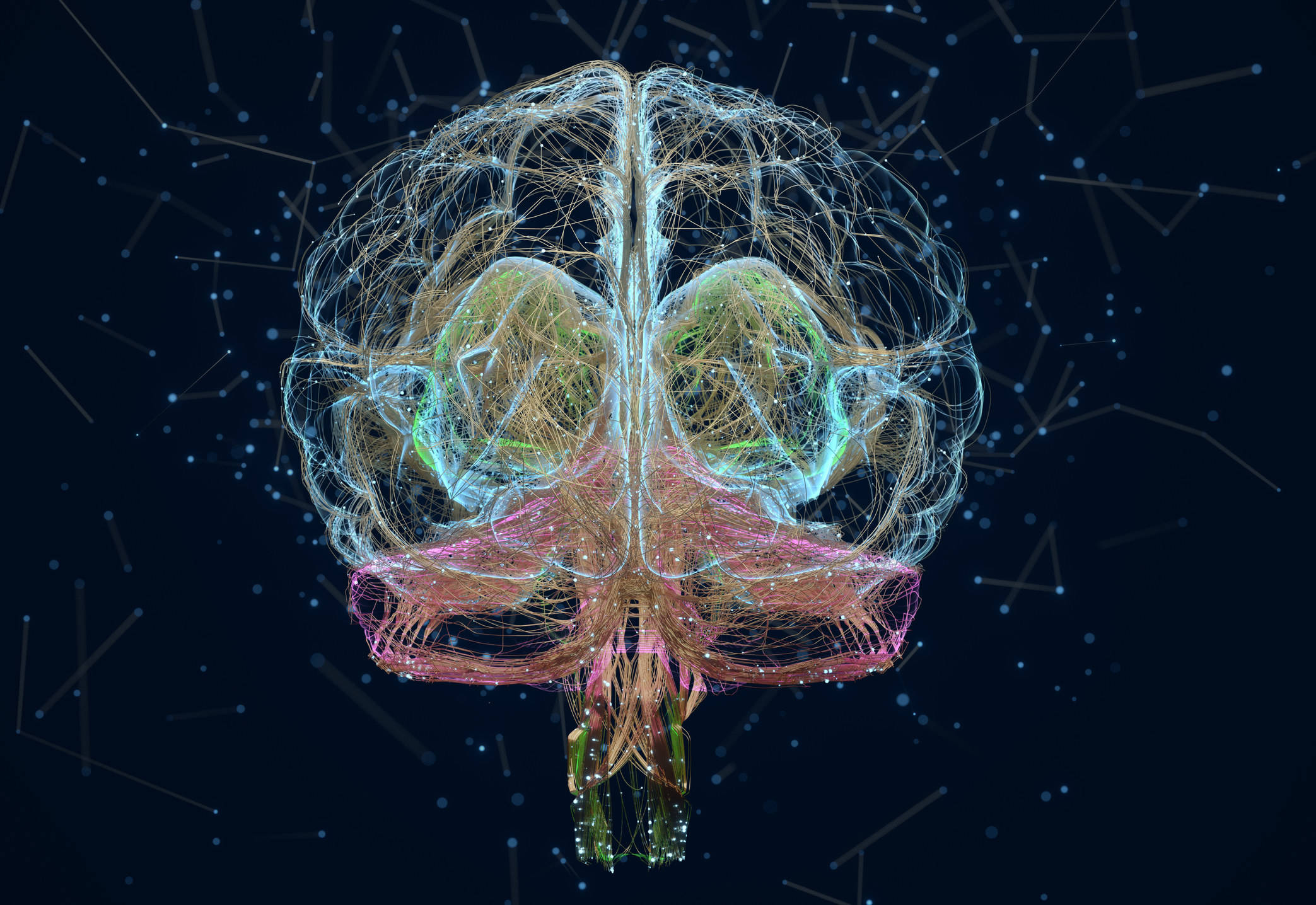A 19-year-old woman named Sydney Marshall recently shared her horrifying experience of finding out birth control had caused a blood clot in her brain.
She posted the story on TikTok, where it has received over 10.5 million views and thousands of comments. Sydney says it all started with a headache that turned into a migraine — and no over-the-counter medication would help alleviate the pain.
After her migraine continued for five days and she experienced other symptoms — like vomiting — she headed to urgent care.
The cortisone shot they gave her in urgent care worked for a short period of time, but then she says her symptoms came back and she was admitted to the ER.
After a CT and MRI scan, she found out she had a blood clot in her brain and was told it was likely caused by the birth control she had been on for two years.

Unfortunately, a quick look in the comments will show you that Sydney's experience with serious side effects after being on birth control isn't super rare.

People shared how their birth control has caused them to develop strokes...


...and other medical conditions relating to blood clots.

BuzzFeed spoke to Sydney, who said she first started taking birth control pills containing estrogen and progestin when she was 17 years old and she had never had any side effects prior. "When the doctors told me that I was diagnosed with sinus thrombosis, I was confused and shocked. They explained that this meant I had a blood clot in a vein on the left side of my head that wrapped around the bottom side of my brain," she said.
Following her diagnosis, Sydney has been put on blood thinners that she will continue to take for the next six months. "I am also on oral pain medication. The pain is supposed to subside within the next one to two weeks as the blood thinners begin to start working. The clot should dissolve as the blood thinners begin to work. There are a lot of 'what ifs' when it comes to any medical situation, but I’m sure that if this condition went untreated that I could’ve experienced a stroke," she said.

Sydney's doctors informed her that the pills she was taking had higher amounts of estrogen and that this could be what interacted in her body to cause a blood clot to develop in this way. Sydney made it clear, though, that "all bodies react differently and many different brands of birth control contain the same amount of estrogen" as the one she was taking.

"Overall, I do not think that birth control is dangerous for all women. I think there are many risks with taking it, and there are definitely some things to watch out for. There are many pros and cons to all medicines and I think that women should just be aware of the side effects and possible cons that birth control can cause," Sydney concluded.
BuzzFeed consulted two OB-GYNs to get their perspectives on birth control and blood clots — Dr. Marieme Mbaye and Dr. Cordelia Nwankwo, who both have been practicing for over six years.
Both doctors confirmed that hormonal birth control can increase the risk of blood clots. "Most hormonal birth control pills come in two varieties. One type is estrogen and progestin (known as combination birth control) while the other is progestin-only. We know estrogen increases the activity of coagulation factors and other normal elements of the blood that allow it to thicken, which in turn raises the risk of blood clots forming. However, the risk of a blood clot due to estrogen-containing birth control is thankfully small — 1% or less over 10 years of being on the pill," Dr. Mbaye said.

In general, blood clot symptoms can be different depending on the area of your body. "For a deep vein thrombosis (blood clot in the leg), [you can experience] isolated and persistent swelling, redness, and/or pain in the calf or behind the knee. For pulmonary embolism (blood clot in the lungs), common symptoms would be chest pain, persistent shortness of breath (especially without activity), and the feeling of your heart racing could all be symptoms that warrant further evaluation," Dr. Nwankwo said.

"The main thing the average birth control user can do to decrease their risk of blood clots is really just to try to live a healthy lifestyle. Don't smoke, try to be active more days each week than not, stay hydrated, and eat a balanced diet with a rainbow of veggies and fruits. It's also important to let your prescriber know of any changes to your medical history, because sometimes it will change whether or not we recommend birth control pills or something else," Dr. Mbaye said.

All this being said, Dr. Nwankwo wants people to understand that all medications have risks. "Discuss with your provider what the risks are for you based on your medical history. Hormonal birth control is not without risks and potential side effects, that’s why it’s important to be counseled on it before starting," she said.

So, if you're considering taking birth control, Dr. Nwankwo advises you to first share the reason you want to take it with your doctor. For example, is it just for contraception, or is it for period pain and/or heavy bleeding? "If you have certain types of migraines, then you may be at higher risk for blood clots with estrogen-containing methods. Understand the potential side effects of different methods. Discuss which method makes the most sense for your lifestyle and which methods are most effective for you. When it comes to birth control, it’s not one size fits all."

Additionally, to get more information on birth control as a whole and the potential impacts it can have on your brain, BuzzFeed also spoke to Sarah E. Hill, PhD, research psychologist, and author of the book This Is Your Brain on Birth Control.

And all of that studying and research eventually paid off, in that she was able to dedicate herself to finding out more about birth control and the way it could (or could not) impact our brains.

When it comes to misconceptions about birth control, Sarah said that the belief that it only affects your ovaries is a big one. "This is physically impossible. Shutting off women’s sex hormones (which is what you do when you give women the pill) has an impact on every cell in the body that has hormone receptors. And this is true of most cells in the brain. So changing women’s hormones changes women. It doesn’t just affect whether they are able to get pregnant or not."

Finally, Sarah doesn't think there's any reason to abandon birth control at this point. But we do need to take it more seriously. "We have been super cavalier about being willing to change women’s sex hormones in the name of birth control, acne management, and to manage period symptoms. We don’t need to abandon hormonal birth control, but we do need to take it more seriously. Changing women’s hormones changes women. And this is a big deal. It’s time we treat it as one."

So, there you have it! Informed consent around the medications we put in our bodies is the least we can hope for. Thank you to Sydney for sharing her story, and to Sarah Hill, Dr. Mare Mbaye, and Dr. Cordelia Nwankwo for sharing useful information for our readers.
Got any other questions around birth control? Let us know in the comments.

